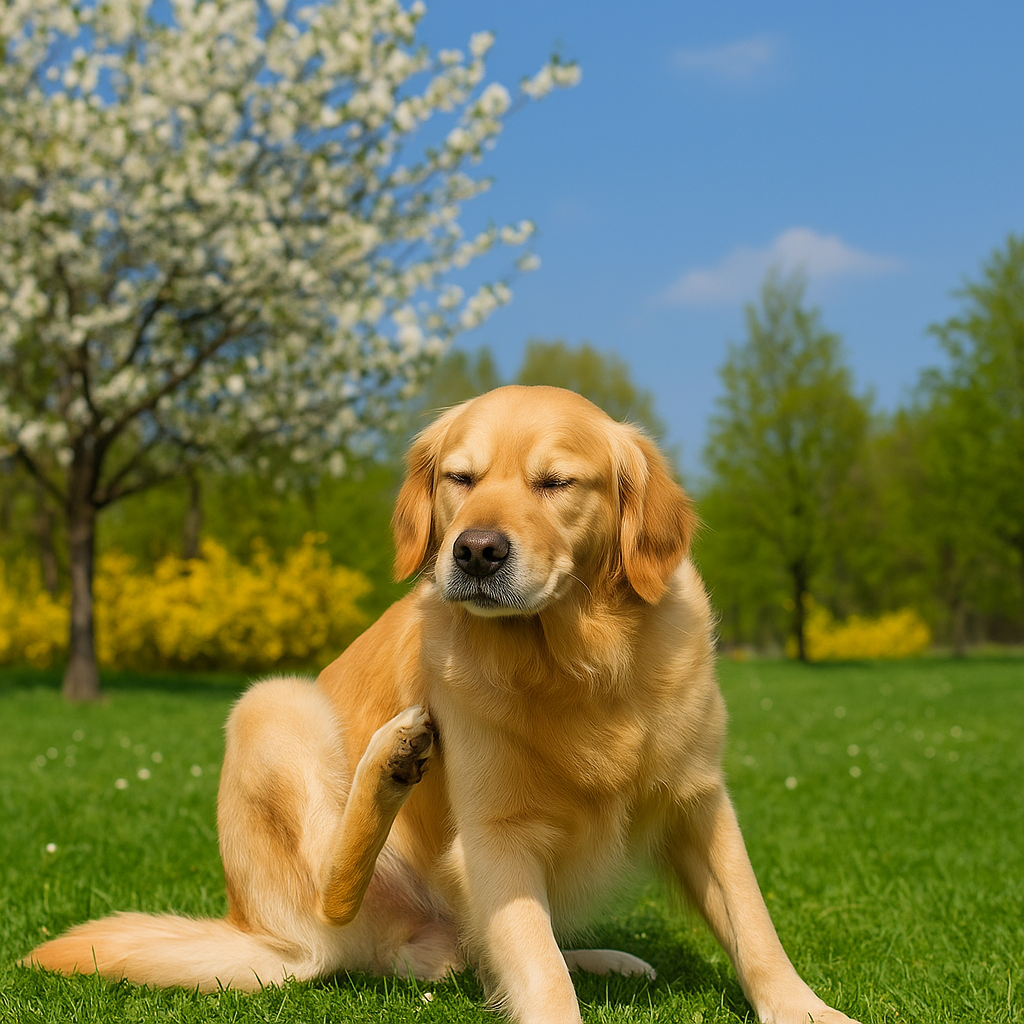
Pet parents in West New York, NJ know how unpredictable our seasons can be. From March’s first bloom to the crisp winds of November, pollen, mold, and other allergens can make allergy season a challenge for people and pets alike. Unlike humans, who sneeze and sniffle, dogs and cats often show allergies through their skin and coat. Persistent itching, licking, ear infections or watery eyes are common signs. If you’re not sure whether your furry friend’s scratching is due to allergies or something more serious, the veterinarians at Edgewater Animal Hospital, located just minutes from West New York, are here to help.
What causes seasonal allergies in West New York?
Spring: tree pollen and flowers
Allergy season in New Jersey begins early. As early as March, cedar, beech, oak and maple trees release pollen. By mid‑spring, cherry, dogwood, and juniper blossoms add even more pollen to the air. These tiny grains cling to your pet’s fur and paws and can trigger itchy skin or watery eyes when they come indoors. Monitoring local pollen forecasts and limiting outdoor time on high‑pollen days can help reduce exposure.
Summer: grasses in full swing
From May through July, grasses like tall fescue and Kentucky bluegrass dominate lawns and parks. Pets often pick up grass pollen while walking or playing, leading to itching and hot spots. Rural areas around West New York (such as the Palisades or local parks) can have even higher pollen counts.
Fall: ragweed and other weeds
When summer gives way to autumn, ragweed takes over. A single ragweed plant can produce up to a billion grains of pollen and irritate allergy sufferers well into November. Other weeds like pigweed and lamb’s quarters also release pollen during fall, so continue monitoring pollen counts through late autumn.
Winter: indoor allergens
Cold weather might feel like a break, but indoor allergens, such as dust mites, pet dander, and mold, can flare in winter. Heating systems circulate dust while high indoor humidity fosters mold growth, so allergies may persist even when the outdoor pollen count is low.
How allergies appear in pets
Dogs and cats generally don’t sneeze like we do. Itching and scratching are the most common signs. Pets may chew or lick their paws, scratch their ears, or rub their belly, leading to hair loss, skin redness, or hot spots. Excessive tearing, watery eyes, or squinting can also indicate environmental allergies. Sneezing and nasal discharge are less common but can occur, especially in small-breed dogs. Ear infections and foul‑smelling discharge often accompany allergies because irritants create a moist environment where bacteria and yeast thrive. Food allergies and airborne allergens can cause similar symptoms, so a professional diagnosis is key.
Effective ways to manage pet allergies
Work with your veterinarian
If your pet’s itching or skin irritation persists, schedule an appointment. Veterinary‑approved medications—such as antihistamines, corticosteroids or immunotherapy—can provide relief for moderate to severe allergies. Never give over‑the‑counter human allergy medicine without veterinary guidance—some ingredients can be toxic to pets. Your vet can also test for food allergies and develop elimination diets or recommend hypoallergenic foods.
Maintain year‑round flea prevention
Flea allergy dermatitis (FAD) is the most common skin disease in dogs; just one or two flea bites can trigger intense itching and hair loss. Fleas are more active in late summer, but they persist all year. Keeping your pet on flea and tick prevention year‑round reduces the risk of FAD and lowers overall allergic burden.
Regular grooming and bathing
Bathing your pet removes pollen and soothes itchy skin. Use pet‑specific shampoos containing oatmeal, which moisturize skin and minimize inflammation. Avoid human shampoos; animal skin has a different pH and can become irritated. Anti‑itch sprays or creams may provide temporary relief. After outdoor play, wipe your pet’s paws and coat with a damp cloth to remove allergens. Regular brushing distributes natural oils and helps the coat shed pollen.
Environmental controls
Improving indoor air quality can dramatically reduce allergy symptoms. Use HEPA filters, vacuum frequently, and wash pet bedding with fragrance‑free detergents. Keep windows closed during peak pollen hours (usually early morning and late afternoon) and use air conditioning to filter pollen. Controlling indoor humidity and cleaning heating vents helps minimize dust mites and mold.
Nutrition and supplements
Adding omega‑3 fatty acid supplements to your pet’s diet can support skin health and reduce inflammation. Consult your vet before starting supplements. While some pet owners swear by local honey for dogs, scientific studies haven’t consistently proven its effectiveness. Ensure any treats or supplements you offer are safe for your species.
Monitor pollen and adjust outdoor activities
Keeping an eye on local pollen forecasts (available through weather apps or pollen.com) helps you plan walks. On high‑pollen days, opt for short potty breaks instead of long hikes and avoid grassy or wooded areas. Wiping paws and fur after these trips further reduces allergen exposure. Limiting time outdoors during high counts is one of the most effective strategies to prevent reactions.
Why choose Edgewater Animal Hospital?
Edgewater Animal Hospital is family‑owned and operated. Founded by Dr. John Kim in 2004, it sits on the Hudson River waterfront between the George Washington Bridge and the Lincoln Tunnel. The practice serves pet owners from Edgewater, Port Imperial, Fort Lee, West New York, Weehawken, Hoboken, North Bergen, and surrounding communities. They take pride in providing exceptional veterinary care in a warm, unhurried environment and remain committed to compassionate, family‑style service.
During allergy season, the team at Edgewater Animal Hospital can diagnose whether your pet’s itching is due to environmental allergens, fleas or a food sensitivity and create a personalized treatment plan. They offer parasite prevention, wellness exams, in‑house laboratory services and nutritional counseling, making them a one‑stop shop for keeping your pet healthy.
Schedule your allergy consultation
Allergies don’t have to make your pet miserable. By understanding West New York’s allergy seasons, recognizing the signs of a reaction, and working closely with your veterinarian, you can keep your furry companion comfortable year‑round. If you notice your pet obsessively scratching, licking or showing other signs of discomfort, don’t wait. Call Edgewater Animal Hospital at (201) 941‑7880 or request an appointment today. With expert guidance from your local West New York veterinarians, you and your pet can navigate allergy season with confidence and enjoy all the parks and river walks our community has to offer.






